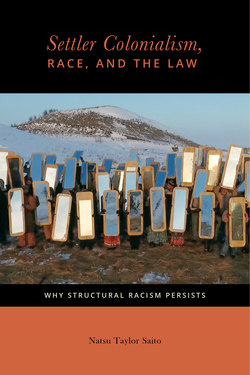Читать книгу Settler Colonialism, Race, and the Law - Natsu Taylor Saito - Страница 15
На сайте Литреса книга снята с продажи.
2 Unsettling Narratives
ОглавлениеThe silent spaces of history raise the most profound questions.
—Howard Berman
Narratives of origin, identity, and purpose tell us who we are, where we have come from and where we are going, what we should fear, what we should want and how we should try to attain it. These understandings structure social relations, identifying who belongs in any given grouping, each person’s status with respect to others, and how decisions for the collective will be made and enforced.1 Our stories can convince us that the status quo is right, natural, and inevitable, or they can open up a world of transformative possibilities.
Nigerian author Ben Okri observes, “One way or another we are living the stories planted in us early or along the way, or we are also living the stories we planted—knowingly or unknowingly—in ourselves. We live stories that either give our lives meaning or negate it with meaninglessness. If we change the stories we live by, quite possibly we change our lives.”2 The stories that shape our lives are embedded in the broader cultural and historical narratives “planted in us” by our families and communities, by our interactions with friends and strangers, by what we see—or do not see—in the media, and by what we are taught—or not taught—in school. In other words, they are refracted through, if not entirely defined by, the dominant social narrative.
Social narratives situate both individual stories and those of entire peoples within cultural paradigms or worldviews, and the master narrative of how the United States came into being and what it now represents is no exception. It is a story firmly situated within a Eurosupremacist paradigm and told from the perspective of the early settler colonists and those who identify as their successors. Not surprisingly, this narrative extols the colonial mission, reinforces the status quo, and promises ever-expanding wealth and well-being. It is also a story that reinforces the racial domination and subordination that are deeply rooted in the psyches of all who live in this society. To effect meaningful change, we will need to live different stories—stories that more accurately represent the origins of the country and the varied experiences of its peoples, stories that recognize the emancipatory potential of multiple and overlapping identities, perspectives, and worldviews.
This book tells a story about racialization—the construction of “races” and the attribution of particular characteristics to them—that diverges from the dominant narrative by focusing on how race and racial inequities have been used, quite strategically, to generate power and wealth for the state and to consolidate control of that power and wealth in the hands of the settler class. Laying the foundation for this alternative perspective that I believe can help us change our lives, this chapter presents an overview of the master narrative—the “consensus reality” we confront on a daily basis—and interrogates some of its silent spaces.
